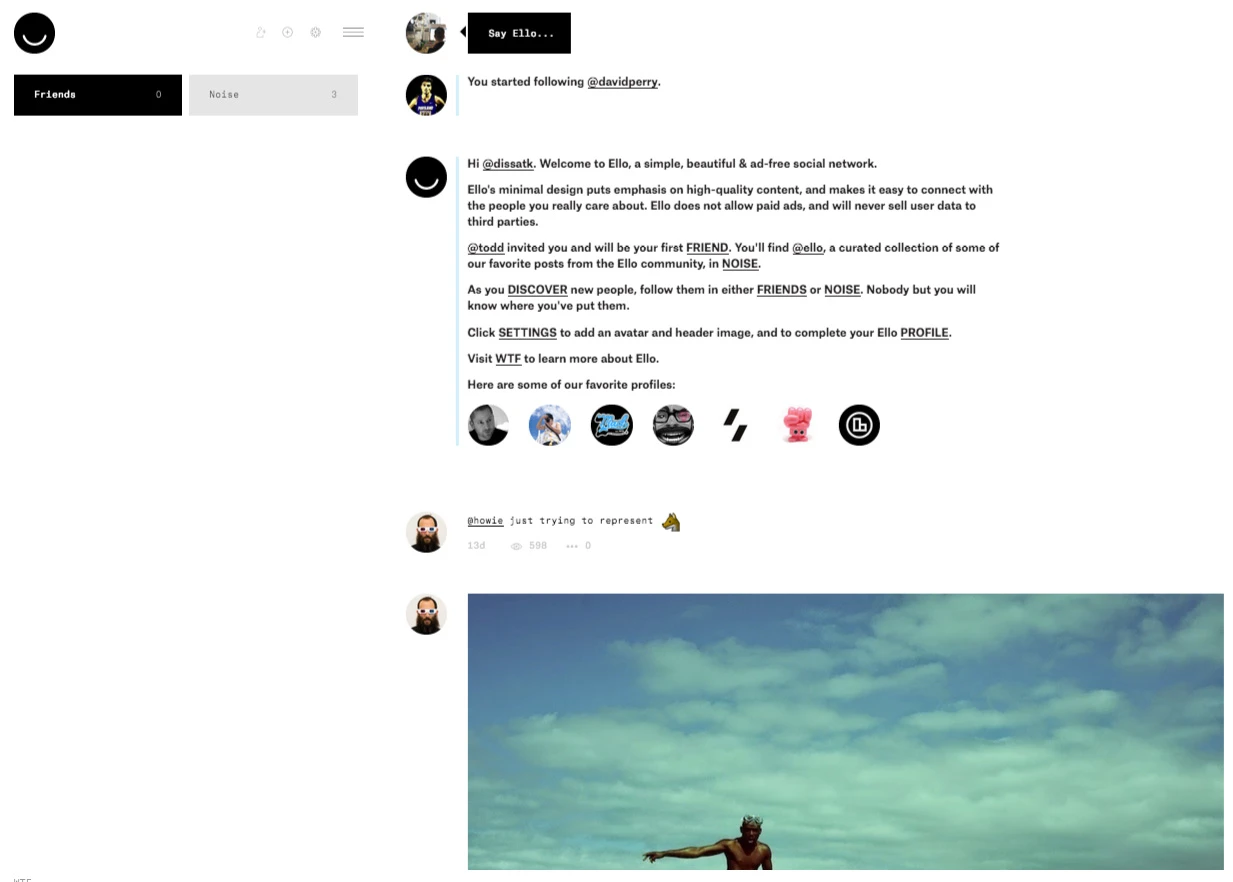When Paul Budnitz was designing Ello, a new social network, with six other people, he had three posters on the wall. “Dieter Rams: less but better. No nested menus. How simple can we make this to make it work,” Budnitz tells Fast Company, “Other picture: Captain Kirk. We just loved how with Star Trek technology you just talk, you don’t press a bunch of buttons. And Kurt Cobain, because who the fuck says we can’t.”
No one, it seems. Ello, a social network driven by “beauty, simplicity and transparency,” as its manifesto states–with a commitment to avoid advertising, has gone viral this week. Although the site has actually been around for over a year — according to Andy Baio, it got $435,000 in seed funding this past January — it caught fire this week, as thousands took to (of all places) Facebook to ask for invites and comment on the new, new thing. Budnitz, an artist and designer who made a name for himself by founding toy company Kidrobot, said that they were getting 3-4,000 invite requests an hour–a huge gain for a social network that had about 90 people when the beta was released about six weeks ago.

“There were seven of us to start, and we built it as a private network,” he says, “We were really fed up with the other social networks, and we wanted to share our art and our work in a place where we wouldn’t be shown ads.” And the name? “Ello is very simple and reductive. We wanted to make something that was very easy to use, so you take out everything you don’t need, so we took out the H.”
This is the heart of Ello’s pitch against the graphic and social sprawl of Facebook. And while the site does solve some of Facebook’s basic issues, it also falls into some of the same traps — already, it seems to have as many critics as fans willing to pay money for beta invites.
Ello’s clean, minimalist layout (the site is literally made up mostly of empty white space) places a greater emphasis on the viewing experience, something lacking in Facebook’s crowded frame. “On Ello, your feed is sacred, it’s yours. It allows everyone to have personal responsibility,” Budnitz says. “That makes it a better choice for artists who specialize in multimedia,” as Zoe Salditch, cofounder of Electric Objects, a physical platform for sharing digital art, puts it. Ello “lets the content lead the way,” she says. “You can upload huge GIF files, and they auto-play.” Video, however, is “definitely lacking.” So far, you can’t embed videos in the stream in the way other sites like Twitter and Tumblr allow.
But aesthetics aren’t the only reason Ello might be better for creatives. “Facebook, politically, is not a good place for free expression,” Salditch says. The dominant social network is known to freely censor images that it deems inappropriate and it doesn’t allow its members to use pseudonyms, a problem for those who take more liberty with their identities. “The naming policy at Facebook is really pushing a lot of artists who work under aliases are moving to Ello for that freedom,” Salditch explains.
In fact, the new site’s popularity is due in part to the fact that you don’t have to use your official identity. As Daily Dot reported, a “great gay exodus” took place from Facebook to Ello as a way to open accounts under different names. Yet the enhanced anonymity might also open the floodgates to unwanted interactions, just as 4chan’s abandoning of usernames encourages a general state of anarchy. The site lacks an approach to dealing with harassment.
“There’s no way of blocking specific people from viewing your content, no way to consent to comments,” Creatrix Tiara, who blogs under a pseudonym that would never fly on Facebook, critiques in an email. Unlike Diaspora, an earlier Facebook alternative that emphasize small social networks, there’s less up-front investment in privacy on Ello. The site “did institute an email address to report harassment and unwanted content, but it’s not clear who is running he email address, how they will redress the situation, and how they will deal with false reports,” Tiara writes. That runs counter to the stated goal of network transparency.
There’s a boundary between permissibility and control that Ello has not delineated. Many new sign-ups are “sex workers, burlesque performers, and other sexuality-related professionals whose… posts have been erased or banned from other social networks simply because of their profession,” Tiara explains. Yet the new site lacks a formalized way to determine what content is appropriate. To prove itself, it must back up its claims of caring for users more than advertisers. “Right now [Ello] assumes that privacy from corporations and privacy from specific people are the same,” Tiara writes.
In an email to users and in an interview, Budnitz promises that “privacy features will be coming in the next couple of days.” For his part, he rejects analogies to other communication platforms. “We’re definitely not a chat app. We’re not short bursts of text. It’s not meant to be like Twitter. Long-form text, large images,” he says, “When we were designed we tried to ignore what others were doing.”

The current situation comes from a rapidly increasing scale–Budnitz says that the traffic jam of invites has caused them to stop accepting new members “until our servers chill out.” But it will now face issues that a more diverse group of users, the consequence of going viral as a Facebook alternative, might face. There, Facebook actually has an advantage, with predetermined user policies and armies of community managers and lawyers in its employ to deal with conflict.
But will Ello even have a chance to mature? It’s far from certain. From the Twitter alternative App.net, which also planned to be ad free, to Diaspora, which shared Ello’s anti-authority, pro-user stance, social network upstarts have a tough time proving themselves.
Users also get bored quickly. There’s a vicious circle of rebellion and decay on social networks just as in politics, argues Jonathan Minard, a filmmaker who focuses on data archives. “The new network establishes itself as a movement of settlers seceding from the old-world establishment, against decadence and oppression,” he says (in this case, bad design and privacy violation). “The micro-nation attracts settlers with the offering of free real-estate”—new accounts, a new brand identity, and social capital, Minard explains. And Budnitz isn’t afraid to make big claims on his new product. “You can’t create something new by asking people what they want,” he says, “You just get what people know. If you want to create something truly new you have to have instincts.”
Yet soon enough, the new becomes old again and the revolutionary claims fade. Like Facebook and Myspace before it, Ello will age. “Every seven years or so, the kids move on,” he says. “The migration cycle continues.”
With additional reporting by Ainsley O’Connell.
Recognize your brand’s excellence by applying to this year’s Brands That Matter Awards before the final deadline, June 7.
Sign up for Brands That Matter notifications here.
